**SPOILERS!** This article is a discussion of plot elements in a specific game, meaning that it contains major **SPOILERS!**
The Talos Principle, created by Croteam and released in 2014, had two writers on board: Tom Jubert and Jonas Kyratzes. The game is described as a first person philosophical puzzle game, and is often compared to Valve’s 2007 hit game Portal.
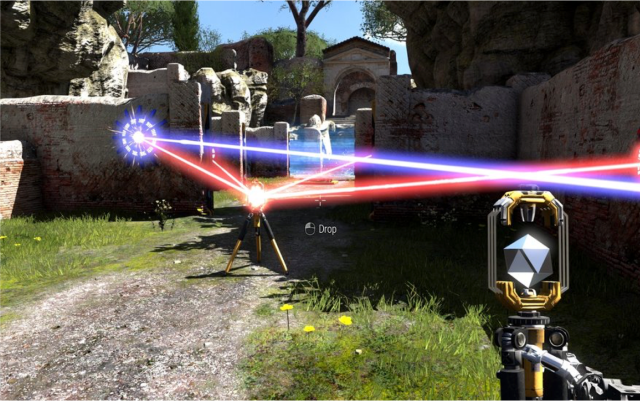
First of all, I think the game is amazing. I experienced a feeling – a sense of wonder and excitement, but also of contemplation and serenity – throughout the playing sessions that I only rarely get. It’s the kind of game I’d love to help create myself one day. And it’s the game I want to discuss this day. No, I don’t want to talk about the philosophy behind the game. This has been done plenty enough already. I want to break down how you as a player are guided through the narrative, and explain the craftsmanship that has gone into the way this is achieved.
The Pinocchio Principle
To sum up the game’s plot: you play as an android who is trying to prove himself worthy as a human being, without him realising this. He must qualify as a human being, meaning that he is able to learn, think critically, and be capable of exerting free will. Throughout the game, you are confronted by two incorporeal characters: Elohim, who appears to be God, and the Milton Library Assistant (Milton for short), who displays traits associated with Lucifer/Satan. If you want to truly finish the game, you not only need to complete all the puzzles, but also climb the forbidden tower in the centre of the game’s hub-world. This is an act of rebellion against Elohim and he will challenge you one last time. If you make it to the end, you are deemed worthy and your mind is removed from the computer simulation you have been playing. Your consciousness is copied into a physical android body with which you can explore (and repopulate) the real world after mankind’s extinction event.

The beauty of the game’s narrative is that you initially don’t understand what it is you’re doing or what your actual goal is. You are faced with the information Elohim gives you, which is ultimately revealed to be mostly false or distorted. You need to pay attention to Milton, who appears as a computer algorithm at first, but who soon starts to manipulate you. At the same time, he challenges you to adopt more complex thoughts. The player and the android (who bears your Steam profile name and is otherwise described as a SOMA-unit), are joined as one and walk the same path. They are misinformed at first, yet with each bit of information learn more of the truth behind the trials we are facing.
I know, this is nothing new. A lot of RPGs feature a player character with no knowledge of the world around him. We don’t even need to look at games for that: literature and film often use outlanders (in the broadest meaning of the word) for main characters in a fictional world too. It makes it all the easier to explain how this world differs from our own.
But The Talos Principle does this quite elegantly. It plays with the hypotheses the player assumes. In that sense, we and the android are one. Our brains are filled with knowledge of the world, but we haven’t experienced it yet. The android is shown to be fully capable of understanding language, it knows what a frog is without it being present in the (virtual) world, and it can use a computer. But other than that, it’s a blank slate; a tabula rasa within the simulation of Elohim, much like ourselves.
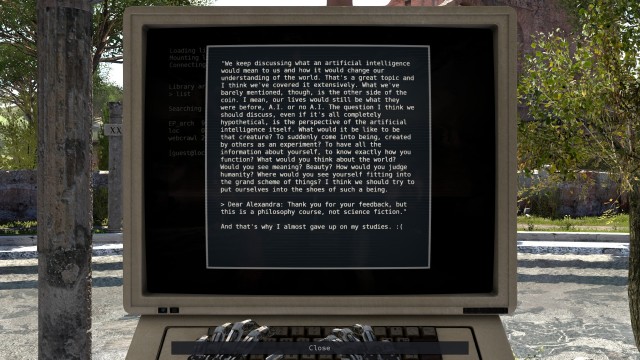
A parallel development process emerges as we solve puzzles and gather collectables: both the player and the android are unsure where they are going or why they are doing it. Most game characters are unaware of their destination, but most at least understand why they do it. It’s to end a war, to defeat a bad guy or to reclaim what is rightfully theirs. But Elohim merely states they that may wander in his paradise if his challenges are completed, leaving any further reason or motivation in the dark.
Religious Allegory
If my summary isn’t making it obvious enough, the game does a wonderful job of drawing the parallels between the trials of Elohim and Judeo-Christian notions of faith and religion. Elohim presents himself as an omniscient and omnipresent god. He manifests as a booming voice from the sky and he is shown performing what appear to be miracles. The environments you play in represent various ages of faith: Ancient Roman, Ancient Egyptian and Medieval European worlds form the background of the puzzles. Elohim asks that you obey his will. Do as he says, and do not under any circumstance climb the forbidden tower that looms over you every time you access the hub environment.
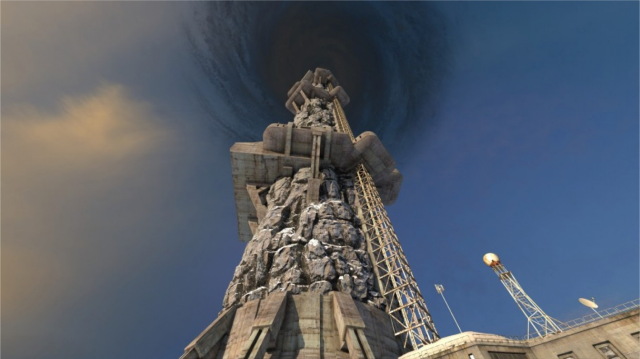
It’s a retelling of the Garden of Eden and the Fruit of Forbidden Knowledge. And just like the Biblical story, the game won’t truly end until the player chooses to climb that tower. The Forbidden Fruit must be plucked for the player to advance. This is quite a bold move by Croteam. The big reveal is that Elohim was originally tasked with challenging the android with the puzzles and to inspire it with the free will to climb the tower. Only then would the android be deemed human enough to be transferred to the real world. But over the course of what must have been countless years, Elohim grew more and more self-conscious and gained a desire for self-preservation. Since the climbing of the tower would render the simulation obsolete, Elohim actively sought to prevent the android from doing that by tempting him with an easier alternative and golden promises (portraying behaviour we usually associate with another Christian figure).
Elohim had become the God of his world, and grew arrogant enough to view the player as his servant. If the player does as he is told, the game is reset; the player did not show any signs of free will and independent thought. If the player defies Elohim, he is rewarded with the ending of the game (and of the simulation world). Croteam and their writers effectively tell the player to embrace free thinking and to shake of the shackles of religious doctrine. I am not religious myself, so I have no problem with this statement. But I do wonder how people who are religious in any way think about the ending of the game.

On a more meta-level: the whole game can be viewed as an allegory of the search for meaning. We all share this same quest of seeking our purpose in the world. Whether you affiliate with a certain religion and follow the tenets of your faith, or believe in the finality of man: we pursue some meaning to attach to our lives. The SOMA-unit does the same. He is ‘born’ into the world, and does as he is told. As he grows more experienced (one could say: he grows older), he/the player starts to think critically and weighs the values of the world that are presented to him. What follows is a deliberate choice between either following Elohim, and choosing your own path. Having a hard time to make up your mind? Allow yourself to be influenced by other ‘players’, who left reports of their experiences en thoughts on the simulation’s walls.

And even if you do elect to climb that tower, even then Elohim offers you a chance to abort your ascent and return to his path. If there wasn’t such an explicit correct ending, the game might evoke some serious theological implications based on the choice that a player makes.
Interpreting the Demo
The Talos Principle used to have a demo available. I believe it’s not easy to download anymore, which is a pity because I interpreted its contents to be the almost exact opposite to that of the full game. In the demo, you may try a handful of puzzles. Elohim presents the rules of his world, and you’re set to go. Below, I included a video walkthrough for you in case you didn’t play it.
Now, what I find interesting is what happens after the 22:10 mark. You see, just like in the full game, you may elect to collect stars – but in order to be able to do so, you must bend the rules of the puzzles. For example, you need to find a way to transport equipment out of the contained puzzle zones. Collect a specific star in the demo world, and the sky turn dark, the music becomes ominous and the world becomes glitchy.
The way I interpreted this is that Elohim asks you to live in his world. However, there are secrets there that we (Man) are not supposed to find. By meticulously analysing the world around us, we may find a way to access the secrets (Science). But Elohim (God) never intended for us to find these secrets, and when we persist in chasing after these secrets, he shows his discontent. You are at a crossroads then: either you desist and obey Elohim’s wishes, or you ignore the warnings and continue your search for the stars. Collecting all the stars results in access to another puzzle, which allows you to try another tool. The storm clouds are present in the full game, but in a different context and the effect (and my interpretation) is lost there.
The Voice of Humanity
Finally, I want to take a moment to discuss the moment where everything comes together – at least in my experience. Throughout the game, there are audio recordings for you to collect. These recordings function as time capsules and they contain messages from the creator of the androids and the simulated environment. She explains that her team was struggling with finding a way to cultivate human nature in inhuman entities. Finally, they found the solution in solving problems. This is what they thought the essence of achieving the potential of being human was all about. And this is the moment when you – the player – realise what you’ve been doing all along. You are a rat in a maze who suddenly understands the goal of the experiment he partakes in.
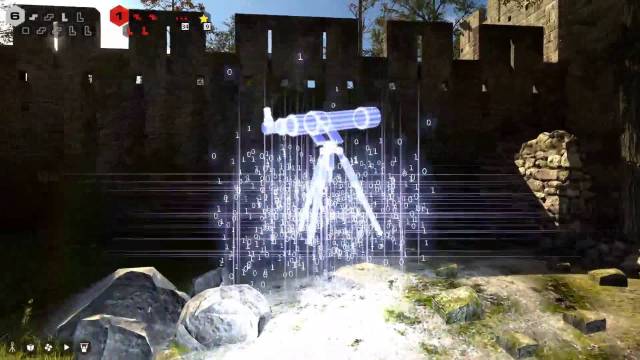
After this revelation, your goal in the game shifts. Before, you were obeying Elohim. You were solving the puzzles because he asked you to, and in the meantime you were gathering clues about the world you are in and the world on the outside. But after listening to the recording, you start to wonder if there is a greater purpose you should pursue. You look for clues that may help you break Elohim’s influence and let you walk your true path. It’s not Elohim you serve, but humanity. You are the last effort of the human species to preserve its culture.
Perfect Overlap
Truth be told, I’m having a hard time articulating why the story in The Talos Principle works so well. I would argue it’s the parallel learning process; we learn about the world at the exact same rate as the SOMA-unit. It has no previous conscious experiences in Elohim’s simulation. It is no a tabula rasa, it’s the ultimate tabula rasa. Moreover, as a player you are in the ideal game environment. It is okay to be stuck at a puzzle. The SOMA-unit requires no sleep or food; you may stand in position perpetually until you do solve it. It makes no difference for the simulation or the fate of the world, whereas Chell in Portal would ultimately succumb due to lack of sustenance.
The perfect overlap of motivation and level of knowledge that exists between the player on the one hand and the story’s protagonist (the SOMA-unit) on the other, causes an organic sense of discovery of the world. It’s not artificial, ironically enough. This is what distinguishes it from other games. Compare this to Geralt of Rivia in CD Projekt RED’s 2007 game The Witcher. You could figure out what is going on before the protagonist does. This doesn’t work in The Talos Principle, because the protagonist and you are one and the same.
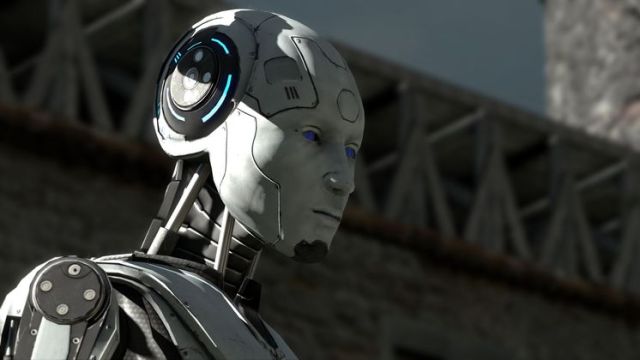
By carefully releasing information particles, the designers and writers are able to manipulate the player into making false or correct assumptions about the world around them. When the SOMA-unit is fooled or enlightened, so are you and vice versa.
So to sum it up, The Talos Principle allows you to discover a world through the eyes of an entity that has no experience in that world yet, much like yourself. Therefore, the choices you make for the SOMA-unit while playing the game are a true reflection of your own curiosity and courage. Will you defy that world’s god without any guarantees towards a happy ending, and why? Are you determined to uncover the truth of past events, and motivated to tease out the facts from the chaotic library? And the final question: is The Talos Principle about the question of whether an inanimate object might be considered human… or does it question your own humanity?
I have but the deepest respect for anyone who succeeds in inciting these kinds of questions in a person just by playing a game.

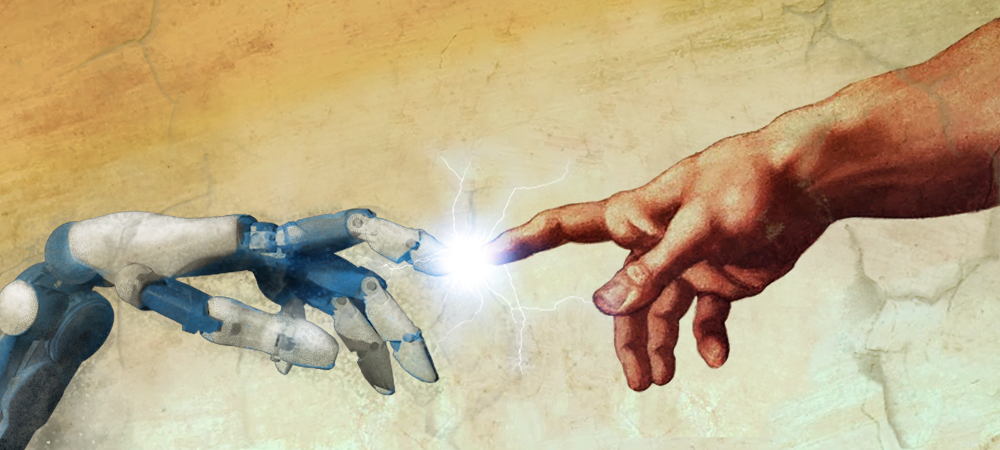
—Watch out “Hell blade senua’s sacrifice” SPOILER AHEAD— (btw you reader, must play that game at least once.
I formerly missed to add this game as others like Banner Saga but now reading your articles I actually was quite convinced to buy them and so I added to my wish list. Hopefully one day will find some time to play them.
I have to say that this Oral technique is used also in HellBlade Senua’s Sacrifice and with a very similar purpose. I am writing a thesis and I wanted to include this fact in it.
How sound is coming into games and I have to say I haven’t seen it used in the form of words and conscience used in similar ways ever before (not that I played all the games of this world and the other).
I don’t wanna explore this fact as it takes another article to explain all the feelings and paths where you are led to with Senua during her journey, but one thing must be said: little by little you become Senua and you soon get to learn you must deal with your problems focusing on the solution, you must learn not to listen to voices and you must learn to bend difficulties at your own advantage… It might sound rethorical here, I surely am, but if you experience this in Hellblade Senua’s Sacrifice this understanding will be everything but rethorical; Antoniades really manages to bring the magic of games back as he states in an article where he was interviewed by Pc Gamer some months ago.
ciao!
Sounds fascinating, Marco! Thanks for sharing!
Hellblade is actually on MY wishlist. I plan to play it in VR. I’ll move it to the top of my backlog, since others have recommended it to me as well!